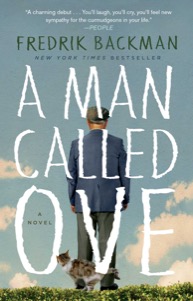
Reading A Man Called Ove is an awful lot like what it’s like to meet and get to know a person in real life.
You start out with your first impression. Ove is a grumpy 59-year-old man. He’s rude and annoyed by pretty much anything and anybody. His grumpiness is played to comedic effect over and over. He battles a stray cat, the dog who keeps peeing on his deck, the people parking where they shouldn’t be, and the driver backing into his mailbox because he doesn’t know how to properly back up a trailer—just to name a few. He’s a curmudgeon who seems to finds the world annoying.
But as you read, you learn a bit more about Ove. And as you do, you find out there’s much more to him than meets the eye. He doesn’t get annoyed for the sake of being annoyed. He’s annoyed because he grew up with clearly defined principles instilled in him at a young age. As he’s grown older, he sees a world that doesn’t always value those same principles. When he gets upset about people driving their car by the residential houses despite a sign saying not to do exactly that, he’s not just upset just by the act; he’s upset that no one seems to understand why it upsets him.
You start to learn about his past and you come to realize his story is more connected to the majority of the supporting characters than you first assume. You learn that there’s a great deal of good in him, underneath his rough exterior.
The flashbacks help to fill in a lot of context, but the present is just as important. Most notably, the changes brought upon when Parvaneh, an pregnant Iranian immigrant, moves in next door with her husband and their two daughters. Parvaneh and Ove’s interactions are some of my favorite parts of the book. Parvaneh is never fooled by his act. She refuses to allow Ove to dismiss her, and over time she and her two daughters (Ove never really grows fond of her husband) melt away a lot of the hardness and depression that had settled over him.
And as Ove warms up to them, we warm up to him.
The story bounces back and forth between making you laugh and punching you right in the emotions. It teaches that there’s more to a person than what you see at first glance.
It also teaches you the power of not just talking, but acting. As Ove at one point states:
Men are what they are because of what they do. Not what they say.
It’s reflected in the way Ove acts towards others. His comments are off-key, but his behavior is sincere. He puts up a fuss, but throughout the book, he is there when other people need him to be. His words may be what leads to your first impression, but his actions are what end up defining him.
I think that’s why Parvaneh ends up gaining so much of Ove’s respect. She never tries to help Ove with some sort of a dramatic speech and she never lets what Ove says drown out what Ove does. She, too, seems to value what people do over what people say. The little comments, his gruff tone of voice—those things don’t phase her. They amuse her because she seems to recognize that there’s more to him. She never hesitates to admonish him if he says something out of line, but the only times she ever really lets loose on Ove is when his actions themselves have gone too far.
The risk in emphasizing the power of actions is that the power words can have may be overlooked. But I would argue that’s not the case here. One of the most closely explored relationships, we learn, was destroyed in no small part because of what was said. It’s a good reminder that what we say has power too.
The book has apparently sold remarkably well, something that appears to have surprised just about everyone involved in the publication process. I don’t think it’s that hard to see why, though. Ove, as we discover, is a man with a good heart who feels lonely and out of place. I think all of us can relate to that on some level.
The story is simply told, and even a little familiar at times, but also surprisingly poignant.